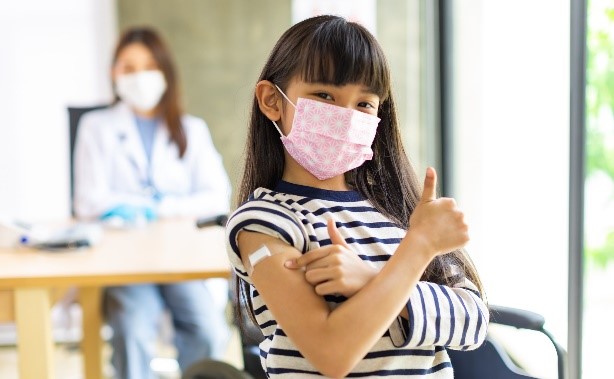With kids age 5-11 years of age now eligible for COVID-19 vaccines in Canada, many parents have questions around having their child vaccinated for COVID-19. You might find the decision to vaccinate your child more difficult than the decision to get yourself vaccinated. As a parent, I know I had questions.
By doing some reading, I found the answers to my questions. Thankfully, there were lots of credible resources available to help me make an informed decision.
How do I know the vaccine is safe when it was developed so quickly?
All COVID-19 vaccines approved in Canada go through the same stages of development and testing as all other vaccines to ensure that they are safe and effective. The vaccines were developed faster than before because of never-before-seen levels of collaboration and funding around the world. This video provides an overview of how the COVID-19 vaccine was developed.
Why the 8-week interval?
The National Advisory Committee on Immunization (NACI) recommends children 5-11 years of age receive two doses of the paediatric formulation of the Pfizer-BioNTech COVID-19 vaccine, at least eight weeks apart. Research in adult populations showed us that a longer interval between doses (such as eight weeks) provides an improved immune response, as well as longer lasting protection.
What side effects are normal after vaccination?
As with most vaccines, some kids may experience one or more mild side effects such as redness, soreness and swelling at the injection site, tiredness, headache, muscle aches and/or chills. These side effects usually go away after a few days.
What about the risk of Myocarditis and Pericarditis?
Myocarditis (inflammation of the heart muscle) and pericarditis (inflammation of the lining of the heart muscle) has been reported following vaccination with mRNA COVID-19 vaccines. Although, it is unknown whether myocarditis/pericarditis will occur in children, no cases have occurred in the initial Pfizer trial for children 5-11 years of age. Classic myocarditis/pericarditis (unrelated to COVID-19) is less common in younger children 5-11 years of age, than in teenagers. The vaccine dose for kids is 1/3 the dose of the youth/adult dose. This along with the 8-week interval is thought to lower the risk myocarditis/pericarditis even further. The risk of myocarditis/pericarditis following vaccination is rare. In fact, the risk of myocarditis/pericarditis is greater with a COVID-19 infection.

Why should my child receive the COVID-19 vaccine?
- The paediatric Pfizer vaccine is safe and effective in protecting children 5-11 years of age from getting sick from COVID-19. Results of clinical trials show that children who received two doses of the vaccine, eight weeks apart; developed a strong immune system response and had a 91% lower chance of getting sick with COVID-19.
- Unvaccinated individuals are more likely to become infected with COVID-19 and are also more likely to be hospitalized compared to vaccinated individuals. Although COVID-19 symptoms in children tend to be mild, some children have developed more severe symptoms or required hospitalization, even without underlying health conditions. There is also a risk of long-term complications.
- Vaccination for COVID-19 can contribute to your child’s overall well-being. COVID-19 has had a significant impact on children’s mental, social and emotional health. The loss of in-person school and reduced social interactions has affected friendships and family connections. Vaccination is a way to ensure that children can continue their routines of daily life and not miss important activities.
- Getting your child vaccinated goes beyond protecting your child, it also builds community protection. Even if your child has a mild case of COVID-19 or no symptoms at all, they can still spread the virus to others. Getting vaccinated can help protect their friends, family, grandparents and others who are at greater risk of severe disease.
- High community protection though vaccination also reduces the risk that the virus will change and develop new variants. We know that some variants of concern can be more severe, spread more easily and decrease our protection from the vaccine.
I hope you found this information useful as you make this important decision for your family. You’ve got this! If you still have questions or concerns about the COVID-19 vaccine and your child, talk to your doctor or check out the list of vaccine resources to help parents make an informed decision section on our website.

You can also connect with us at the Halton Region Health Department:
- Tweet us @haltonparents
- Follow us on Facebook
- Email us at haltonparents@halton.ca
For parenting information or to speak with a Public Health Nurse (every Monday to Friday from 8:30 a.m. to 4:30 p.m.) simply call 311 or 905-825-6000.


Well done!! Thanks for sharing
Miss you all,
Caroline
Caroline Parker, RN, BScN, MHM
Supervisor, Healthy Living
Healthy Families
Health
Halton Region
905-825-6000, ext. 2906 | 1-866-442-5866
[Halton Region logo] [Twitter logo] [Facebook logo] [LinkedIn logo] [YouTube logo]
[http://webaps.halton.ca/signature/webstie.png]
This message, including any attachments, is intended only for the person(s) named above and may contain confidential and/or privileged information. Any use, distribution, copying or disclosure by anyone other than the intended recipient is strictly prohibited. If you are not the intended recipient, please notify us immediately by telephone or e-mail and permanently delete the original transmission from us, including any attachments, without making a copy.
It seems, possibly, the vaccine increases covid rates.